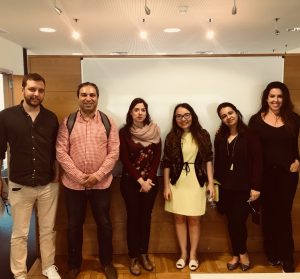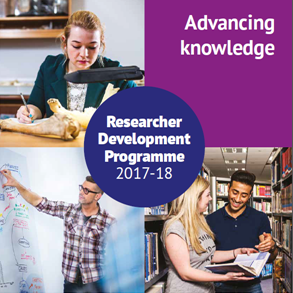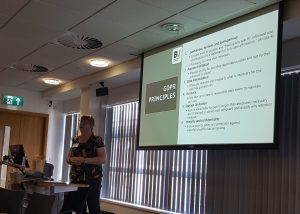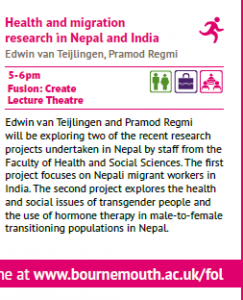My Erasmus+ Staff Mobility training programme took place at the University of Granada (UGR) from 7th to 11th May in the historic town of Granada, Spain.
With over 500 years of history, Universidad de Granada has approximately 80,000 students, over 3,000 researchers in more than 400 research centres in all areas of scientific knowledge, all spread over five different campuses with two of the campuses located on the African continent.
I was particularly interested in its research profile and being one of the top 10 universities across Spain, this staff training week was the best opportunity for me to gain insights into their institutional structure and practices, in particular where research support is concerned.
The 11th International Staff Training Week, divided into five main tracks including IT, International Relations, General administration, Library and Research Support Services, was to provide a platform for the exchange of good practices and know-how between the UGR and its partner universities. The five-day programme included plenary sessions, round tables, workshops, guided tours and social events.
 On the first day, we were officially welcomed by the Vice-Rectorate for Internationalization of the University, who also presented the history and overview of the university, including its research structure, demographic and life on its two campuses on the African continent – the Ceuta Campus and the Melilla Campus.
On the first day, we were officially welcomed by the Vice-Rectorate for Internationalization of the University, who also presented the history and overview of the university, including its research structure, demographic and life on its two campuses on the African continent – the Ceuta Campus and the Melilla Campus.
As a conclusion to the orientation programme, we were fortunate to be taken on a guided tour around the Hospital Real building, which was built more than 500 years ago as a hospital and now the rectorate building of the University. The architecture of the building was interesting, with its rich history evident in the build and designs of its various courtyards. A statue of King Charles V stood in one of the courtyards; a significant figure, as the founder of the University in 1531.
For the next three days, we were divided into the five main tracks and I was in the Research Support Services track, along with other academic and professional staff from Finland, Belarus, Czech Republic, Romania, Greece, Georgia, etc. Some of the learning and experience sharing sessions organised included overview of the Research Support Office for International Projects, Euraxess: Services and Research Career, Bibliometrics, the Research transfer office and its role, MediaLab, the Research Laboratory for Digital culture and society, the International Welcome Centre, etc. The MediaLab concept in particular, and the important role it plays at the University of Granada as ‘a research hub and an experimental space for researchers in exploring creativity and new ways of generating knowledge in digital societies’, has been very inspiring and is something that will definitely be shared with the wider team.
On the third day, we were taken on an excursion to the Centre of Scientific Instrument building and we came up close and personal with ‘The Shrimp’. I found out later that it had nothing to do with seafood, or food for that matter. The Shrimp is one of two such state of the art microprobes in the whole of Europe and one of thirteen, in the entire world. Costing more than EUR 4million, the Shrimp is formidable and highly priced. The scientist, who worked with it, spoke passionately about the research and the rich data that can be drawn from the technology on minerals and rocks.
 Some of the other machines we saw also included an Atomic Force Microscope, a Laser Raman Spectrometer, an Optical Emission Spectrometer. One of the coolest parts of the building, which our tour guide admitted sadly to be a disappearing ‘craft’, was a laboratory full of broken glass instruments and a skilled technician standing in the midst of them all, fixing them ready to be used in the laboratories again.
Some of the other machines we saw also included an Atomic Force Microscope, a Laser Raman Spectrometer, an Optical Emission Spectrometer. One of the coolest parts of the building, which our tour guide admitted sadly to be a disappearing ‘craft’, was a laboratory full of broken glass instruments and a skilled technician standing in the midst of them all, fixing them ready to be used in the laboratories again.

On the last day, we came together as a cohort again for the concluding ceremony where we were presented with the Certificate of Attendance and serenaded by the University’s orchestra.
Apart from the workshops and round table sessions, this week-long staff training week was also packed full of delicious and cheap Spanish food and great sight-seeing opportunities! In case you didn’t know, in Granada, you get a free tapas with every drink that you order!
These were just some of the amazing tapas I had time to sample.


And churros for breakfast!

One of the things that drew my attention walking around the beautiful city of Granada, apart from the historic and amazing architecture of the buildings, were the delicate Ginko trees that lined the avenues.




By the time my training programme was confirmed, unfortunately it was too late to get tickets to visit the Alhambra, the famous palace and fortress complex, originally constructed as a small fortress in AD889. However, hiking up the Albicin, I managed to find a little restaurant overlooking the Alhambra and had the most amazing time enjoying a drink while appreciating the magnificent view of the Alhambra, with still snow-capped mountains in the background. It was perfect!

In conclusion, this week-long Staff Mobility Training programme at the University of Granada was an excellent blend of informative and insightful seminars, fantastic best practice exchanges, networking and round table discussions, with an impressive cultural and culinary experience.
I would highly recommend the Erasmus+ Staff Mobility programmes to everyone at BU!
Pengpeng Hatch
Funding Development Officer
Research and Knowledge Exchange Office
















 The Department for Environmental, Food and Rural Affairs (Defra) is investing up to £400,000 in projects that use digital technology to record and track the movement of waste through the economy. Funding for the competition is under SBRI (the Small Business Research Initiative), which aims to bring together government and businesses to find innovative solutions to public sector challenges.
The Department for Environmental, Food and Rural Affairs (Defra) is investing up to £400,000 in projects that use digital technology to record and track the movement of waste through the economy. Funding for the competition is under SBRI (the Small Business Research Initiative), which aims to bring together government and businesses to find innovative solutions to public sector challenges.


 On the first day, we were officially welcomed by the Vice-Rectorate for Internationalization of the University, who also presented the history and overview of the university, including its research structure, demographic and life on its two campuses on the African continent – the Ceuta Campus and the Melilla Campus.
On the first day, we were officially welcomed by the Vice-Rectorate for Internationalization of the University, who also presented the history and overview of the university, including its research structure, demographic and life on its two campuses on the African continent – the Ceuta Campus and the Melilla Campus. Some of the other machines we saw also included an Atomic Force Microscope, a Laser Raman Spectrometer, an Optical Emission Spectrometer. One of the coolest parts of the building, which our tour guide admitted sadly to be a disappearing ‘craft’, was a laboratory full of broken glass instruments and a skilled technician standing in the midst of them all, fixing them ready to be used in the laboratories again.
Some of the other machines we saw also included an Atomic Force Microscope, a Laser Raman Spectrometer, an Optical Emission Spectrometer. One of the coolest parts of the building, which our tour guide admitted sadly to be a disappearing ‘craft’, was a laboratory full of broken glass instruments and a skilled technician standing in the midst of them all, fixing them ready to be used in the laboratories again.



























 Fourth INRC Symposium: From Clinical Applications to Neuro-Inspired Computation
Fourth INRC Symposium: From Clinical Applications to Neuro-Inspired Computation Writing policy briefs
Writing policy briefs Upholding Excellence: The Concordat to Support Research Integrity
Upholding Excellence: The Concordat to Support Research Integrity Today’s Documentation Will Serve Tomorrow’s Justice
Today’s Documentation Will Serve Tomorrow’s Justice ECR Funding Open Call: Research Culture & Community Grant – Application Deadline Friday 12 December
ECR Funding Open Call: Research Culture & Community Grant – Application Deadline Friday 12 December MSCA Postdoctoral Fellowships 2025 Call
MSCA Postdoctoral Fellowships 2025 Call ERC Advanced Grant 2025 Webinar
ERC Advanced Grant 2025 Webinar Horizon Europe Work Programme 2025 Published
Horizon Europe Work Programme 2025 Published Horizon Europe 2025 Work Programme pre-Published
Horizon Europe 2025 Work Programme pre-Published Update on UKRO services
Update on UKRO services European research project exploring use of ‘virtual twins’ to better manage metabolic associated fatty liver disease
European research project exploring use of ‘virtual twins’ to better manage metabolic associated fatty liver disease